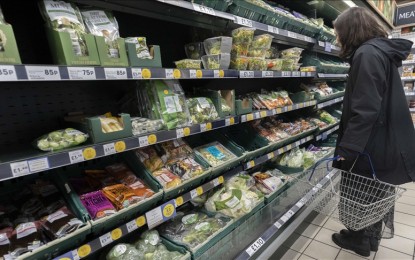[5.26] 5월에 인플레이션이 다시 하락할 가능성이 있다: 이코노미스트
컨텐츠 정보
- 15,332 조회
본문
MANILA – 식품 가격 하락으로 인해 5월 헤드라인 인플레이션이 6.1%로 가속화될 것이라고 이코노미스트가 금요일 말했습니다.
"일부 식품 가격은 2022년 후반부터 2023년 초까지 일부 폭풍 피해, 특히 일부 부품을 강타한 전단선으로 인한 공급 증가로 이어져 식품 가격을 낮추는 데 도움이 되는 더 나은 기상 조건으로 인해 최근 완화되기 시작했습니다. RCBC(Rizal Commercial Banking Corporation) 수석 이코노미스트 마이클 리카포트(Michael Ricafort)는 필리핀 뉴스 에이전시(PNA)에 말했다.
인플레이션은 3월 7.6%에서 4월 6.6%로 3개월 연속 하락했습니다.
"Ricafort"에 따르면 일부 농산물 가격은 계속해서 하락세를 보였습니다.
그는 이러한 감소가 설탕과 양파의 제한된 수입, 육류, 쌀, 옥수수, 석탄 등에 대한 수입관세 인하의 1년 연장, 그리고 지역 개선을 돕기 위한 기타 비금전적 조치에 기인할 수 있다고 말했습니다. 식량 및 기타 농산물의 공급 및 가격 인하.
"Ricafort"는 밀, 콩, 천연 가스, 석탄, 철, 강철, 구리, 니켈과 같은 다른 글로벌 원자재 가격도 하락했으며 앞으로 몇 달 동안 인플레이션 압력을 완화하는 데 도움이 될 수 있다고 말했습니다.
"2023년 6월부터 7월까지 시작되는 현지 임금 인상, 교통 인상 및 2차 인플레이션 효과의 기념일은 양적으로 많은 요인으로 인해 2023년 하반기 인플레이션의 전년 대비 추가 감속으로 이어질 것입니다. 그때까지 더 높은 인플레이션 기저 효과는 잠재적으로 훨씬 더 느린 인플레이션율로 이어져 2023년 후반까지 전년 대비 3%에서 4%까지 느려질 수 있습니다."라고 "Ricafort"는 말했습니다.
현재 55.20페소 환율은 수입 비용을 줄이는 데 도움이 될 수 있으며 현지 연료 펌프 가격의 추가 하락을 지원하고 전반적인 인플레이션을 완화하는 데 도움이 될 수 있다고 그는 말했습니다.
그러나 "Ricafort"는 물가 상승으로 이어지고 인플레이션 둔화를 늦출 수 있는 상쇄 위험 요인에는 전기 요금 인상, 수도 요금 인상, 농업 생산과 공급을 감소시킬 수 있는 엘니뇨 가뭄 등이 포함된다고 말했습니다. (PNA)
This is the Original rticle from PNA NEWS
[5.26] Inflation likely down anew in May: economist
MANILA – Headline inflation will likely decelerate to 6.1 percent in May due to lower prices of food, an economist said Friday.
"Some food prices already started to ease recently on better weather conditions that led to some increase in supply that helps in lowering food prices, after some storm damage in the latter part of 2022 up to early 2023, especially the shear line that hit some parts of the Visayas and Mindanao," Rizal Commercial Banking Corporation (RCBC) chief economist "Michael Ricafort" told the Philippine News Agency (PNA).
Inflation declined for the third consecutive month in April, settling at 6.6 percent from 7.6 percent in March.
According to "Ricafort," prices of some agricultural commodities continued to correct lower.
He said the decline could be attributed to the limited importation of sugar and onions, the one-year extension of the reduced import tariffs on meat, rice, corn, coal, among others, as well as other non-monetary measures to help improve local supply and lower the prices of food and other agricultural products.
"Ricafort" said prices of other global commodity such as wheat, soybean, natural gas, coal, iron, steel, copper, nickel, also declined and could help ease inflationary pressures for the coming months.
"The anniversary of the local wage hikes, transport hikes, and second-round inflation effects starting June to July 2023 would quantitatively lead to further year-on-year deceleration of year-on-year inflation in the second half of 2023 due to much higher inflation base effects by then that could potentially lead to much slower inflation rate to as slow as 3% to 4% year-on-year levels by the latter part of 2023," "Ricafort" said.
The peso exchange rate currently at 55.20 levels, could also help reduce importation costs and support further rollback in local fuel pump prices and help ease overall inflation, he said.
"Ricafort," however, said that offsetting risk factors that could lead to some pick up in prices and slow down the deceleration of inflation include higher electricity rates, higher water rates and the El Nino drought that could reduce agricultural production and supplies. (PNA)
관련자료
-
이전
-
다음


